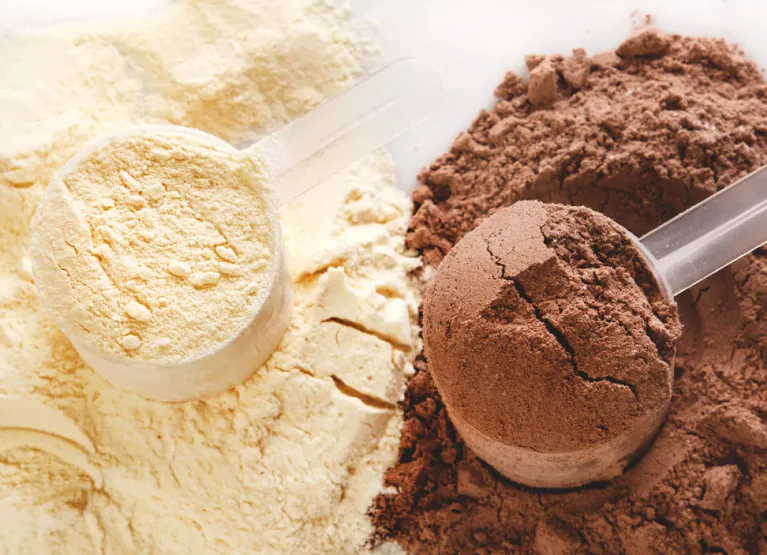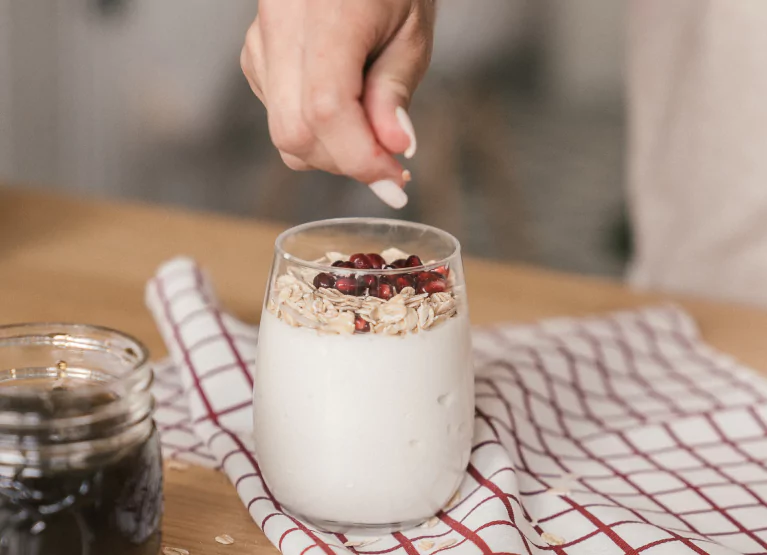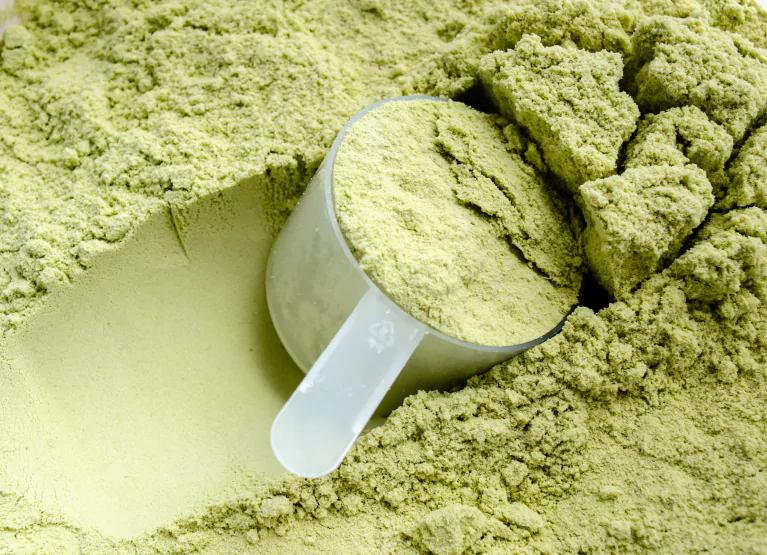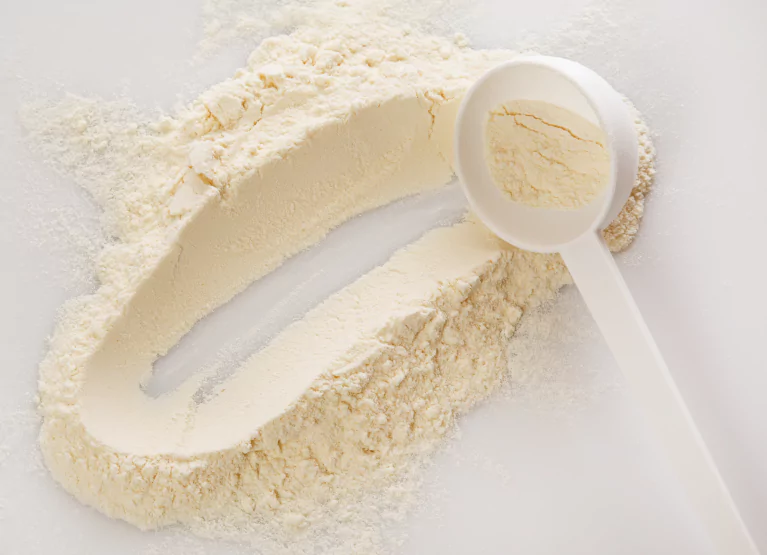Nutritionist-Recommended Low Calorie Protein Powders

Key Takeaways
If you've read our article on the importance of protein, you'll know that this macronutrient plays a vital role in the human body. From muscle building to supporting thyroid function, your body relies on amino acids, the building blocks of protein, for many of its processes.
Unlike carbohydrates, which can be limited in some diets (such as the keto diet) with minimal side effects, adequate protein intake is crucial for overall health. This is why it's important to know how much protein you consume daily.
As with most nutrients, most of your protein intake should come from whole food sources. However, if you struggle to reach your daily recommended goal, protein supplements like protein powder can be a great way to supplement your protein intake. Whether you need a vegan protein powder or a low-calorie option for weight loss, there are endless varieties of protein powders on the market. So what’s the best choice? We’re here to help!
Read on to find out what the board-certified registered dietitians and nutritionists we spoke to have to say about the importance of protein. Plus, pick from five of their favorite protein powders!
The Importance of Protein for your Health

Protein performs numerous vital bodily functions, which are crucial for muscle gain and increasing muscle mass. Beyond supporting muscle growth, thyroid function, and gene expression regulation, protein plays an important role in catalyzing nearly all chemical processes in the body, including blood sugar management.
Protein is also essential for the following functions:
- Improving insulin sensitivity
- Supporting brain health and cognitive performance
- Digestion (including liver function) and weight management
- Regulating reproductive hormone levels
- Immune function
- Structural support (Proteins like collagen and elastin provide structural support to skin, bones, and connective tissues)
- Satiety & appetite regulation
Complete Protein Sources
Complete protein sources are foods that contain all nine essential amino acids. These include pasture-raised poultry, eggs, quinoa, Greek yogurt, wild seafood, soy products, and minimally processed red meats.
The Nutrisense Nutrition Team recommends sourcing most protein from whole food sources. However, a high-quality protein powder can be a great addition to these foods and help increase your daily protein intake.
Incomplete Protein Sources
Incomplete protein sources do not contain all nine essential amino acids. Although they do not promote bone health, these foods are still a great way to supplement your meals with extra protein and can be paired with other complete protein sources.
By combining certain incomplete proteins, you can form complementary proteins that can provide adequate amounts of all the essential amino acids. Here are some examples of incomplete protein sources:
- Legumes such as lentils and beans
- Nuts
- Seeds
- Vegetables
- Whole grains like brown rice
If you're on a plant-based diet, you may want to vary your protein sources to ensure you're getting various amino acids (especially the essential amino acids). As mentioned, some plant-based protein sources listed above are deficient in certain amino acids.
Complementary proteins do not need to be eaten together in the same meal as long as the day's overall meals supply them all. Some examples of complementary protein pairings include whole grains and beans or nuts and legumes.
How Much Protein Should I Be Eating?
When it comes to your diet, you should always discuss your individual health needs with a dietitian or nutritionist. However, when it comes to the adequate amount of protein you should consume daily, the research recommends around 0.8 grams per kilogram of body weight for sedentary adults over 65.
However, that may not be enough. As VP of Health at Nutrisense, Kara Collier, RDN, LDN, CNSC explains, “Even though traditional guidelines might recommend 0.8 grams/kg, that recommendation is typically the minimum amount you need to avoid a deficiency. Which is different from the amount you need for optimal health.” Kara recommends the following:
- Sedentary adults under the age of 65 (with no injuries or illnesses) should ideally be consuming around 1-1.3 grams of protein per kilogram of body weight.
- Active adults under the age of 65 (with no injuries or illnesses) should be consuming 1.2 to 2.2 grams of protein per kilogram of body weight.
- Older adults and those recovering from an injury or illness should also be consuming 1.2 to 2.2 grams of protein per kilogram of body weight.
- If someone is obese, they should use ideal body weight rather than actual body weight to find the protein intake that suits them best.
How to Consume Enough Protein on a Daily Basis
Include a Protein Source at Each Meal
Including 0.4 to 0.55 grams of protein per kilogram of body weight per meal (for example, this is 27-38 grams of protein for a 150 lb person) can help you get to your target range of overall protein consumption. This can consist of various complete and incomplete protein sources (such as a serving of chicken, black beans, and quinoa).
Consume Protein-Rich Snacks

While the protein consumed at each meal should make up the majority of your overall protein consumption, you can also supplement this with high protein snacks. Snacks such as Greek yogurt, dried edamame beans, mixed nuts, turkey and cheese roll-ups, or even a protein bar with simple ingredients can help ensure you hit your protein target.
Add Protein into Smoothies
Including a protein blend in your smoothies or daily shakes is a great way to boost your overall protein intake. This will help you build lean muscle and add extra vitamins and minerals to your diet.
To give your post-workout protein shake extra flavor and nutrients, toss in spinach, berries, oats, or peanut butter.
Is Using Protein Shakes a Good Idea as Meal Replacements?
Opting for protein shakes as meal replacements can be a convenient choice, particularly for those with hectic schedules or precise fitness objectives. Research indicates that a protein-rich diet, when paired with meal replacements, can substantially improve long-term nutritional intake. This approach not only aids in weight loss but also enhances overall health.
By incorporating high-protein foods and balanced meal replacements, individuals can ensure they receive essential nutrients while effectively managing their weight.
What are the Downsides of Protein Powder?
The problem is that not all protein powders are equal, and many are deficient in various nutrients or include subpar protein quality options. The most common protein content sources are milk proteins, whey isolates, whey concentrates, soy protein, and pea protein.
Each has varying bioavailability, taste, price, and sustainability differences. Before investing in one, it's always a good idea to research the ingredient list to ensure the protein source matches your dietary needs, health conditions, and personal values.
If you have a sensitive stomach, ensure your meal replacement is lactose—and gluten-free. You should also avoid artificial ingredients and sweeteners. Soy, hemp, or egg protein are great options for lactose-intolerant people.
For muscle recovery and lean muscle mass building, whey protein is an excellent option due to its high bioavailability and rapid absorption. However, if you follow a plant-based diet or have dairy allergies, pea protein is a suitable alternative.
Protein Powder Ingredients to Avoid
Many times, fat and fillers are added to meal replacement products that can hinder weight loss objectives. Sunflower lecithin, Maltodextrin, and Xanthan Gum are common fillers that can result in bloating, digestive issues, and nutrient deficiencies.
If you’re looking for an ideal protein powder, check out our nutritionist recommendations below!
What is the Difference Between Collagen Powder and Protein Powder?
While both collagen powder and protein powder can support your diet, they differ considerably in their purposes, benefits, and sources. Collagen powder primarily comprises collagen peptides derived from animal sources such as bovine hides or fish scales.
It is touted for its benefits to skin health, joint function, and gut health. Unlike typical protein powders, collagen does not offer a complete amino acid profile since it lacks tryptophan. Therefore, while collagen can complement dietary protein intake, it cannot fully replace conventional protein sources for muscle synthesis.
What Type of Protein Powder is Best for Weight Loss?
When aiming for weight loss and trying to maintain a calorie deficit, choose a low-calorie content protein powder that provides high-quality protein without excess carbs or sugars. Some brands use artificial sweeteners and fillers to enhance flavor, but these may not be the healthiest choices.
If you prefer a sweet protein powder, look for those sweetened with natural ingredients like natural flavors, stevia, or monk fruit extract. One of the easiest ways to add flavor to your protein shake is to use unsweetened cocoa powder to turn your drink into a delicious chocolate milkshake instantly.
Do Nutritionists Recommend Protein Powder?
Credentialed, expert nutritionists, including those you can choose to work with 1:1 at Nutrisense, frequently suggest protein powder as a convenient and effective means to boost protein intake, particularly for individuals with elevated protein needs or those who struggle to meet their requirements through food alone.
When recommending protein powders, nutritionists typically highlight the importance of selecting high-quality products that match the individual's dietary preferences and health objectives.
They often advise choosing products free from artificial additives and sweeteners and encourage opting for organic or non-GMO options whenever possible.
Five Nutritionist-Recommended Protein Powders
There are many different protein powders on the market, with popular name brands like Gold Standard from Optimum Nutrition and Orgain's collagen protein powder rising in popularity. With so many options, it can be hard to know which choices are best for your health.
To help you choose wisely, we asked some nutritionists to share their favorite high-quality protein powder choices with us. Let's hear what they are!
1) Marie Funk’s, MS, RD, LDN, Recommendation

Marie says, “I like whey protein powders with minimal ingredients. Options like Raw Grass Fed Whey or Naked Whey are great because the whey protein isolates are clean and simple and have no hidden additives, fillers, or artificial sweeteners. This makes it easy to digest.”
She adds, “You can also easily create your own flavors using other natural foods that provide other nutrients. Just add in some honey and other ingredients like cacao for flavor. Each brand has 97.5 and 120 calories per serving, respectively.”
Marie doesn't recommend brands like Quest Nutrition or Isopure protein powders, explaining that “These brands contain additives like sucralose and carrageenan, which can impair glucose tolerance by altering intestinal microbiota over time.”
2) Amanda Donahue’s, MS, RDN, Recommendation
Amanda shares, “I really like the company True Nutrition for protein powder options. They allow you to customize your protein to the max, from choosing the type of protein you want.”
She adds, “You can choose between isolate powders, grass-fed whey protein, plant options, add in supplements such as electrolytes, fiber, or starches, and even customize the flavoring. The best part is that their products are third-party tested for quality, purity, and safety. You can even choose the packaging you prefer your powder to come in!”
Amanda is hesitant to shop for protein powders sold by third parties online. She cautions, “I don't recommend getting supplements of any kind from Amazon as there's no regulation of resale safety if it's not from the direct source or company.”
3) Kasey Brixius’, RDN, CSSD, IFNCP, Recommendation

Kasey is fond of egg-based protein powders. She explains, “I tend to recommend egg white protein powders, especially for people who have issues with dairy. You can also find some good options for egg white protein powders without extra additives such as artificial flavors, added sugar, and gums.”
She says, “Egg White Protein Powder by Naked Nutrition is a great lactose-free option for lactose intolerant. It's also relatively low in calories (110 calories per serving) compared to other popular options.”
4) Patrick Scheel’s, RD, LDN, Recommendation
Patrick seconds the Raw Grass Fed Whey brand, and explains, “I prefer protein powders with minimal ingredients. This option is one of the best out there, due to not having any ingredients other than whey protein concentrate.”
He explains, “In a pinch, I’ve recommended Isopure zero carb unflavored protein powder. It’s a very affordable whey protein isolate with very minimal ingredients. With an isolate, there are no calories other than from protein.”
Patrick also adds, “The only potential downside to a whey protein concentrate like Raw Grass Fed Whey Is that you do have a few calories from carbs and fat. So, if you want something with fewer calories, this could be a potential factor to consider when looking for the best low-calorie protein powder.”
5) Jordyn Wallerius’, MS, RDN, CD, Recommendation

Jordyn says, “I'm also a fan of Naked protein powders thanks to their limited ingredients. I always recommend their pea protein powder option for my vegan members, which contains 120 calories per serving. It's a great option if you're looking for a plant-based protein powder.”
She adds, “I've also had people with GI issues have good luck tolerating Naked's egg white protein powder. They do sell their products on Amazon, but as Amanda mentioned, it's generally a good idea to buy from the original company when you can.”
FAQs from Our Experts
Is it okay to have protein powder every day?
Yes, it is generally safe to consume protein powder every day, provided you're not exceeding your daily protein requirements. It’s always best to consult a healthcare professional or registered dietitian to determine the right amount for your unique needs.
What is the healthiest protein for weight loss?
In general, complete protein sources, such as eggs, fish, lean white meats, and lean red meat options, are the healthiest forms of protein for weight loss. These sources provide essential amino acids that support muscle growth and repair, helping to increase lean body mass. However, incomplete protein sources can still benefit weight loss as long as they're consumed in moderate amounts and combined with other high-quality protein sources.
How can I make my protein powder taste better?
There are several ways to make your protein powder taste better. You can mix it with water or milk, add fruits like bananas or berries, use natural sweeteners like honey or maple syrup, blend it into a smoothie with other ingredients such as spinach or nut butter, or even bake it into healthy treats like protein balls or high-protein pancakes. Experiment with different combinations to find what works best for you!
Should I still take dietary supplements if I use protein powder?
Deciding whether to take additional dietary supplements alongside protein powder depends on your unique nutritional needs and health goals. While protein powder can help you meet your daily protein intake, it may not supply all the vitamins, minerals, and other essential nutrients your body requires. Consulting a healthcare professional or registered dietitian can guide you in determining which supplements, if any, are necessary for your specific dietary needs.
Can protein powder cause digestive issues?
Some individuals may encounter digestive issues, such as bloating, gas, or stomach cramps when consuming protein powder. These issues can often stem from lactose intolerance if the protein powder is derived from whey or casein proteins or added ingredients like artificial sweeteners and fillers.
To alleviate these digestive problems, consider switching to a protein powder with minimal additives or lactose-free, such as egg white protein or plant-based alternatives. Always examine the ingredient list carefully and experiment with different types to find the best fit for your digestive system.
Find the right Nutrisense programto turn insight into progress.
Find What Works for You with Nutrisense
Protein powders can contain hidden sugars that may cause blood glucose spikes, potentially hindering weight loss and overall health. And, like all other types of food and lifestyle choices, what you pick should also depend on your unique needs. Remember, there’s no one-size-fits-all!
That’s where working 1:1 with a board-certified nutritionist can be of help. Using the data from tools like continuous glucose monitors(CGMs), the nutritionists at Nutrisense can help you learn how your body reacts to different foods, including protein powders. This insight lets you identify what protein powders align best with your health goals.
Want to learn more about our program and how it can help you make informed choices about protein powders? Start with our quiz to see how Nutrisense can support your health journey.
Go Beyond Glucose Data with Nutrisense
Your glucose can significantly impact how your body feels and functions. That’s why stable levels are an important factor in supporting overall wellbeing. But viewing glucose isn't enough. Nutrisense, you’ll be able to learn how to use your body's data to make informed lifestyle choices that support healthy living.
One-to-one coaching
Sign up to access insurance-covered video calls to work with a glucose expert: a personal registered dietitian or certified nutritionist who will help tailor your lifestyle and diet to your goals.
Monitor and measure what matters
With the Nutrisense CGM Program, you can monitor your glucose with health tech like glucose biosensors and continuous glucose monitor (CGM)s, and analyze the trends over time with the Nutrisense App. This will help you make the most informed choices about the foods you consume and their impact on your health.
Find your best fit
Ready to take the first step? Start with our quiz to find the right Nutrisense program to help you take control.

Kara Collier is a registered dietitian nutritionist and certified nutrition support clinician who is passionate about reshaping how we approach prevention, behavior change, and metabolic health. A Forbes 30 Under 30 honoree, she’s helped over 150,000 people improve their metabolic health using tools like continuous glucose monitors and behavior-focused nutrition strategies. Kara has been featured by Forbes, UC Berkeley, and HLTH, and has appeared on top podcasts like Mind Pump and The Genius Life.



.webp)
